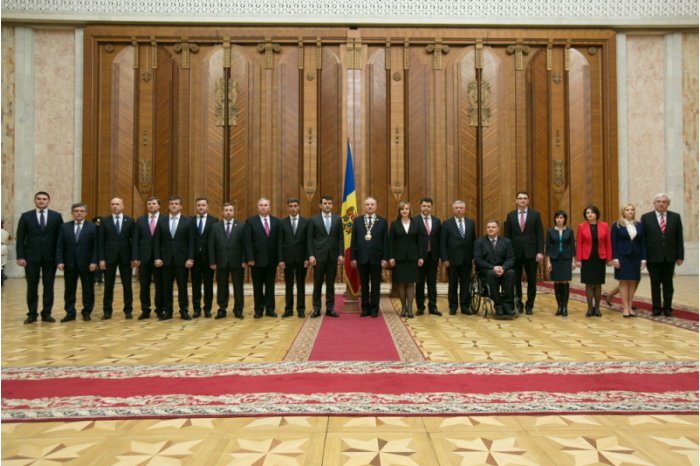By Natalia Timuş (Maastricht University)
During the last electorate mandate (2009 – 2014) Moldova has advanced significantly on its path towards European integration. Visa liberalization agreement, Deep and Comprehensive Free Trade Agreement (DFCTA), and the Association Agreement with the EU have been presented by the Moldovan former ruling coalition as major political achievements and a proof of its commitment to democratic reforms and European aspirations. However the November 2014 elections and the following political turmoil have represented a crucial test for Moldovan political elite regarding its democratic maturity and the domestic development of structures and practices in accordance to European norms and values.
While in 2009 the Moldovan electorate was voting for a change, for breaking up with the Communist Party’s (PCRM) ruling and electing a pro-democratic and pro-European center-right majority, the elections of 30 November 2014 also were defined by the desire to change, yet having the electorate split between those envisaging a European future for Moldova and those opposing the European integration and promoting closer ties with Russia and integration into the Customs Union and Eurasian Union. The domestic electoral preferences were directly influenced also by the regional geopolitical situation, specifically the Russian-Ukrainian conflict and the increase of Russia’s influence within the ‘shared neighborhood’ of the EU and Russia.
Moldovan party system appeared more fragmented in 2014 than in the previous early elections of 2010, specifically on the left of the ideological spectrum, characterized however by the common pro-Russian orientation and direct Russia’s backing of several parties. The reformed Socialist Party (PSRM), comprised of former communists gathered around Igor Dodon, an ex-PCRM leader, emerged as the winner of the 2014 elections, the strongest single party, gaining 20.51% of votes. One of its electoral promises was to annul the EU Association Agreement and to join Russia’s regional projects (Custom’s Union and Eurasian Union). The victory of the PSRM represented also a new phase in the evolution of Moldovan left, which has been largely dominated by the Communist Party.
Another major newcomer was the party ‘Patria,’ under the leadership of Renato Usatii, a controversial businessmen in Russia, with a dark past and lack of political experience. Before becoming the leader of ‘Patria’ in October 2014, little has been know of him in Moldova. According to pre-election polls, his party was expected to win as much as 8-14% of votes, contributing to a potential left-wing governing coalition with PSRM and PCRM, which would have shattered the pro-Western path of Moldova’s center-right forces and turn the country closer to Russia. However, ‘Patria’ was expulsed from the election race just three days before the D-day, on grounds of electoral violations, specifically campaign financing, arguably Russian donations.
In these circumstances, November elections allowed five parties to pass the electoral threshold and be represented in Moldovan legislature. (see Table 1.)
| Table 1. Parliamentary seats distribution (101 seats) in 2010 and 2014 |
|
| November 30, 2014 | November 28, 2010 |
| PSRM — 25 PLDM — 23 PCRM — 21 PDM — 19 PL — 13 |
PCRM — 42 PLDM — 32 PDM — 15 PL — 12 |
Source: http://www.e-democracy.md/elections/parliamentary/
The elections have witnessed the lowest voter turnout since the declaration of independence of Moldova (57.28%), largely explained by the disenchanted supporters of the former center-right ruling coalition (PD, PLDM and PL) due to the salient corruption scandals involving ruling elites and the prevalence of economic interests over principle-oriented political behavior of governing parties.
Although the former center-right ruling parties have together gained 55 seats out of 101, the results represented more a loss than a victory of the pro-European coalition. It was clear from the beginning that the center-right negotiations for government formation will not be easy, taking into account the previous break up of PL from the governing coalition. The negotiations, which started as early as 4 December 2014, lasted almost two months and failed to lead to an agreement between the PDM and PLDM, on the one side, and PL, on the other side, particularly regarding the distribution of power positions (e.g. presidential candidate), the Prosecutor’s office and some specific ministries. Despite the mediation of European Union’s representatives By contrast to the advanced democracies, such as the Nordic countries, minority government represents an ‘exotic’ and a rather unrealistic scenario for an emerging democracy like Moldova, particularly in a situation when the political forces are divided on major issues regarding domestic and foreign policies. The inappropriateness of the minority government has proven as early as the new government ‘Leanca II’ failed to secure a vote of confidence of the parliamentary majority on 12 February 2015, when neither PL or PCRM voted in its favour. Ex-prime minister Leanca declared that he is resigning from PLDM, criticizing party decision to stop negotiations with the PL and still backing the idea of a pro-European coalition as the sole solution to avoid the political crisis and early parliamentary elections. The PDM and PLDM, however, continued moving on alone and advancing a new cabinet, under the leadership of Corneliu Gaburici, a businessmen with no former political experience, which managed to receive the support of the parliamentary majority thanks to PCRM’s votes. Leanca and PL commented on the investment of the new cabinet as the formalisation of the partnership PDM-PLDM-PCRM. Judging on previous political behavior of the parties currently represented in Moldovan legislature, the chance of survival of a minority government is rather low and the biggest test lies ahead, when specific reforms, such as the ones envisaged by the EU Association Agreement, would have to be approved by the parliamentary majority. Photo source: http://www.moldpres.md/en/news/2015/02/19/15001075 [1] The delegation comprised the ALDE president, Graham Watson, the president of the foreign policy commission of the EP, and the vice-president of the EP group of Alliance of Socialists and Democrats, Knut Fleckenstein.


